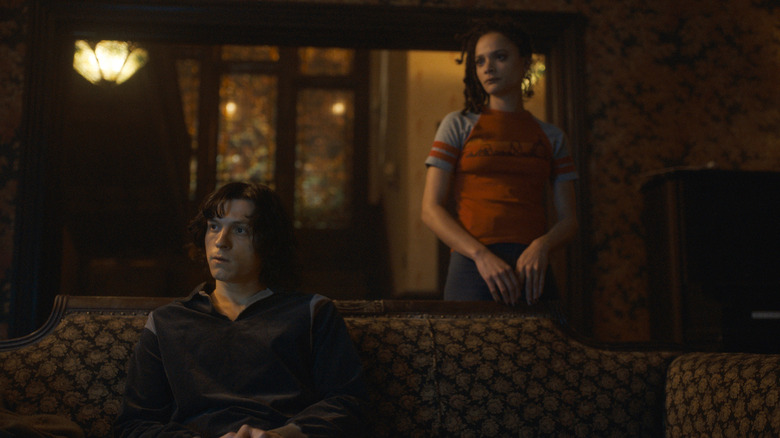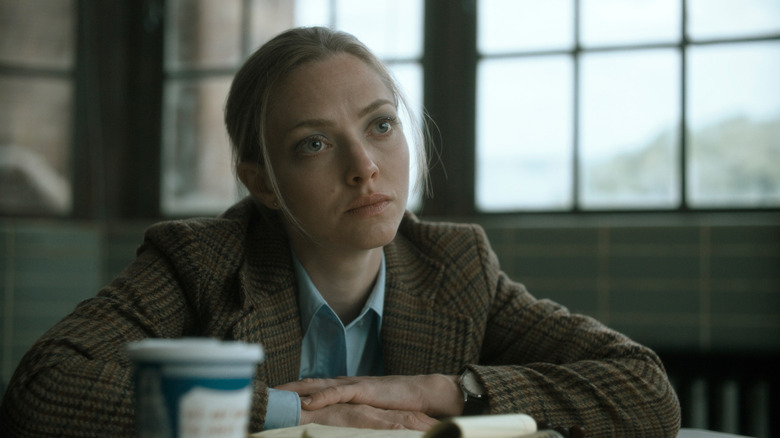The Crowded Room Review: The Crime Drama Lacks Clarity And Captivation
- The acting is excellent
- The writing is a mess
Apple TV+'s "The Crowded Room" has a lot going for it. Starring Tom Holland and Amanda Seyfried, Akiva Goldsman created the series set in 1979 about an investigator (Seyfried) who must solve the mystery behind a young man (Holland) and the shocking crime for which he's been arrested. It seems primed to be a stand-out entry in the current wave of true crime TV shows, especially since this is a story inspired by the biography "The Minds of Billy Milligan" by Daniel Keyes. If only that were the case.
While "The Crowded Room" spends a lot of time in courtrooms and interrogation areas, it's far from a traditional true crime series. Instead, the first five episodes are spent trying, unsuccessfully, to get a grip on the story from Danny Sullivan's perspective. The focus shifts in the sixth episode when we finally see what's happening from investigator Rya's point of view, and everything becomes clear. It's a mess, and though the performances are strong, the writing is so muddled, especially in those first five episodes (half the show!), that it's hard to imagine someone having the patience to watch all 10 chapters.
It's difficult, though not impossible, to make my points without getting into spoiler territory. Many of the major plot points I have a problem with involve, at least in part, something Apple has specifically requested be kept under wraps. And that doesn't even begin to cover the fact that, based on my previous study, I believe they've gotten aspects of Danny's condition wrong. Nonetheless I'll try to give you a fair review while still preserving the mystery.
The first five episodes are muddled
The story begins with the crime that Danny's arrested for. It seems pretty straightforward, but things quickly become confused and, frankly, boring. That's because the writers start messing with the timeline in the interrogation room. Rya, the investigator, seems competent and professional, but it's hard to understand why she isn't saying certain key things. At the same time, it's hard to understand why, in flashbacks, everyone thinks Danny is so weird. He may be a little odd, but the talk about him seems to be out of proportion to what we're seeing.
The trouble is that we don't know key things about Danny for the first five episodes, and instead of giving us an "aha" moment when the reason his story has been so muddled is revealed, it's annoying that it took so long. I can understand what Akiva Goldsman, who's also the writer or co-writer on all of these episodes, was trying to do. He wrote the movie "A Beautiful Mind" back in 2001 and that didn't reveal the protagonist's condition until later in the story either. But what worked for "A Beautiful Mind" does not work for "The Crowded Room."
First, the protagonists' conditions are not the same and, therefore, don't benefit from the same treatment. Second, television is a different medium than film, and what worked beautifully in the confines of a two-hour movie doesn't work as well in 10 hour-long episodes, especially when you have a week in between them to wonder about what just happened. So we get taken through Danny's story for the first five episodes, but something feels off the whole time. More importantly, things are boring because the most interesting thing about Danny's story is being withheld.
The last five episodes are better, but still dull
As a result, the first half of the series is a disjointed mess that doesn't come together until the sixth episode. Up until then, in addition to Danny's confusing story, we get information about Rya in fits and starts that doesn't quite add up either. But the sixth episode lets everything snap into place by essentially calling for a do-over. Whole scenes are repeated but they're put in the correct order and additional scenes take place that we didn't know we were missing.
It's nice to finally understand what's happening, but it's also irritating to find that we were working with half the information for so long. And while things get a lot clearer once we're seeing the story from Rya's point of view, the show also becomes a much more traditional courtroom drama. This is the better half of the show, because it's obvious what's going on, but it's also a lot less innovative. It's easy to like it for its clarity, but if the first five episodes hadn't happened it wouldn't be nearly as meaningful. Even then, at least once in the back half of the series, they still hide information from you, in the form of a tape that Rya sees but the audience doesn't. This is infuriating, and although you eventually get to see the tape, the revelation is still too little too late. It's more withholding, and by this point it feels gratuitous.
That said, the acting is exceptional. "The Crowded Room" still looks like a prestige show and the actors are a major part of that. Tom Holland is excellent at capturing the nuances of his character, but the other actors are great too. Everyone from Jason Isaacs as Danny's mentor, Jack Lamb, to Sasha Lane as Danny's friend, Ariana, to Emmy Rossum as Danny's mother, Candy, and everyone else is fantastic. Yet while it's easy to understand why they signed on to be a part of a project this high-pedigree, it's hard not to wonder why the writing didn't give any of them pause. While he's a talented actor, Holland can't seem to find a project outside of the "Spider-Man" movies that entirely works, and his status on this as an executive producer makes the oversight here particularly unfortunate.
"The Crowded Room" isn't the winner Apple TV+ wants it to be. I'd love to report otherwise given who's involved, but unfortunately there are too many flaws and frustrations in this story. While I respect the acting, I can't get on board with the writing. It makes this show impossible to enjoy.
"The Crowded Room" premieres its first three episodes on Apple TV+ on June 9 and one episode each week thereafter until July 28.


